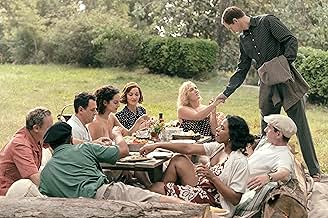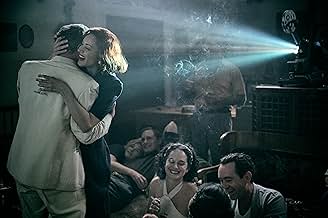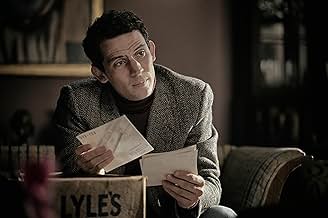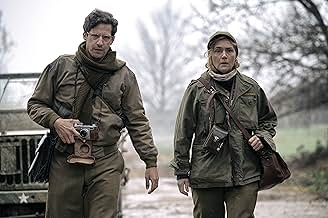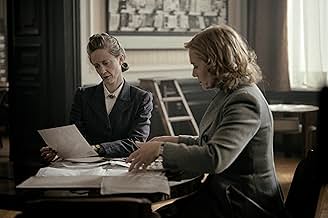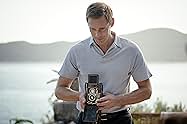La vita e la carriera della fotografa Elizabeth 'Lee' Miller, una modella che divenne un'acclamata corrispondente di guerra per la rivista Vogue durante la Seconda Guerra Mondiale.La vita e la carriera della fotografa Elizabeth 'Lee' Miller, una modella che divenne un'acclamata corrispondente di guerra per la rivista Vogue durante la Seconda Guerra Mondiale.La vita e la carriera della fotografa Elizabeth 'Lee' Miller, una modella che divenne un'acclamata corrispondente di guerra per la rivista Vogue durante la Seconda Guerra Mondiale.
- Regia
- Sceneggiatura
- Star
- Nominato ai 1 BAFTA Award
- 3 vittorie e 17 candidature totali
Riepilogo
Reviewers say 'Lee' is a biographical drama about Lee Miller, with Kate Winslet's performance as a standout. Many praise Winslet and the film's depiction of Miller's life. However, some criticize the pacing, script, and direction, finding it slow and lacking emotional depth. The film's handling of historical events receives mixed reactions. The supporting cast is noted, though some feel underutilized. Cinematography and production design are praised, but narrative structure and character development are contentious.
Recensioni in evidenza
The story of former model turned photographer Elizabeth Miller, Lee, who recounts her times as War correspondent for Vogue during the second world war.
The two key elements, Lee's story, and the performance from Kate Winslet. Two things that make this a pretty good movie. It's not one I'd want to watch again in a hurry, as it is a little slow moving in parts, but I'm glad I saw it.
It is a fascinating story, one that is definitely worth some further reading on, Lee was definitely a pioneering figure, going into a world where women were excluded.
It's very well made and nicely directed, the production team did a fine job, it looks very good.
Winslet absolutely nails it, but at times it feels like a one woman show, some of the supporting characters are a little thin and half baked. Andrea Riseborough and Josh O'Connor are both rather good.
It's definitely worth seeing, even if just for Winslet's fine performance.
7/10.
The two key elements, Lee's story, and the performance from Kate Winslet. Two things that make this a pretty good movie. It's not one I'd want to watch again in a hurry, as it is a little slow moving in parts, but I'm glad I saw it.
It is a fascinating story, one that is definitely worth some further reading on, Lee was definitely a pioneering figure, going into a world where women were excluded.
It's very well made and nicely directed, the production team did a fine job, it looks very good.
Winslet absolutely nails it, but at times it feels like a one woman show, some of the supporting characters are a little thin and half baked. Andrea Riseborough and Josh O'Connor are both rather good.
It's definitely worth seeing, even if just for Winslet's fine performance.
7/10.
Giving this an 7.5/10 rating
A very and honest as you can get biopic drama of Lee Miller, famous photographer from the 1930's and through out the second world war, showed the world the horrors in the world during her time. Played by, Kate Winslet, this is very much her film, and rightly so. Again, more fine work from an actor who still can pull your attention and works hard at it. Alexander Skarsgård and Andy Samberg are the backup who just as superb in this really near top notch movie.
Ellen Kuras directs us through pretty much a hellish world with touches of light and happiness, which are few, and proper, given the subject matter, and it is eerily lovely looking and tough too. Writers Liz Hannah, Marion Hume and John Collee give us a solid script and story, given how nasty the world was in, as Andrea Riseborough and Marion Cotillard also, pull out the stops in the acting, and look real rough, only Josh O'Connor is the clean person here.
The film could of been a bit more edger and stronger, but then it would of been very graphic and a higher rating, alienating more of he audience, who need to see this film. A good bit of cinema, and with what is out there, it shines and is never, never boring.
A very and honest as you can get biopic drama of Lee Miller, famous photographer from the 1930's and through out the second world war, showed the world the horrors in the world during her time. Played by, Kate Winslet, this is very much her film, and rightly so. Again, more fine work from an actor who still can pull your attention and works hard at it. Alexander Skarsgård and Andy Samberg are the backup who just as superb in this really near top notch movie.
Ellen Kuras directs us through pretty much a hellish world with touches of light and happiness, which are few, and proper, given the subject matter, and it is eerily lovely looking and tough too. Writers Liz Hannah, Marion Hume and John Collee give us a solid script and story, given how nasty the world was in, as Andrea Riseborough and Marion Cotillard also, pull out the stops in the acting, and look real rough, only Josh O'Connor is the clean person here.
The film could of been a bit more edger and stronger, but then it would of been very graphic and a higher rating, alienating more of he audience, who need to see this film. A good bit of cinema, and with what is out there, it shines and is never, never boring.
I've seen a few review that seem quite dismissive about the scope and importance of Lee. But if you know about the limited freedom of women during this time period you will totally appreciate the audacity and productivity delivered here. Lee was spurned on by personal trauma to do good with her hard fought freedom to operate in a man's world.
Lee has all the period clothing and historical accuracy which is no small feat, while showing the sheer determination it took to achieve access to the final Nazi front of WW2. People back home in the US didn't believe exactly the horrors and certainly not the numbers of the Holocaust. It was the undeniable courageous journey by Lee which brought back the unmistakeable proof and witness of an evil place in history
Knowing that one can't unsee certain such things in person gives one empathy for the cost of doing photo journalism. Many get martyred while doing their work when jailed or taken hostage in authoritarian regimes. But in this case, to have survived seems as permanently affecting a way to finish such an important task.
Lee has all the period clothing and historical accuracy which is no small feat, while showing the sheer determination it took to achieve access to the final Nazi front of WW2. People back home in the US didn't believe exactly the horrors and certainly not the numbers of the Holocaust. It was the undeniable courageous journey by Lee which brought back the unmistakeable proof and witness of an evil place in history
Knowing that one can't unsee certain such things in person gives one empathy for the cost of doing photo journalism. Many get martyred while doing their work when jailed or taken hostage in authoritarian regimes. But in this case, to have survived seems as permanently affecting a way to finish such an important task.
Have just got home from watching "LEE" at my local Picture House.
Blimey, that was DARK. Well, it isn't all dark, but by the time you get to the last half hour... oooft. Let's just say that "feelgood" isn't a term anyone's ever going to apply to this one.
It's not like I went in unprepared: I'd seen Kate Winslet doing the promotional chat show appearances, and as I am already a great admirer of Lee Miller's photojournalism, I knew the kind of subject matter we'd inevitably be exploring, but still... don't say you haven't been warned. This film presents you with you the hideous fact of Nazi genocide, very convincingly as the revelation it must have been in the moment, without (thankfully) a scrap of sentimentality.
Winslet is magnificent in the title role - as is everyone else, to be honest: there are no shoddy performances to be found - and, speaking as a Rolleiflex TLR user myself, it was clear that she had done her homework viz how to wield that lovely machine convincingly. There were moments when the nit-picky photography pedant in me did query whether some of the interior photos were being taken in such low light that it was unlikely to have left any usable impression on the relatively slow film stock available in the 1940s, but let's not quibble!
It's quite a long movie and events are presented in a simple, linear fashion (via a series of chronological flashbacks) with rather uniform pacing throughout - personally, I would have preferred a bit more variation in pace; your taste may differ.
My only really negative criticism has to do with one, frankly bizarre, piece of casting. The role of Englishman Roland Penrose is given to Swedish star Alexander Skarsgård - whose plucky attempt at an English accent is ...I think "variable" is the kindest word for it. It was hard to tell what part of England he was supposed to be from, or indeed what social class, and there were several moments when he didn't sound any kind of English at all. I had to suspend my disbelief on some pretty strong elastic whenever he opened his mouth. Ah well... go figure!
Blimey, that was DARK. Well, it isn't all dark, but by the time you get to the last half hour... oooft. Let's just say that "feelgood" isn't a term anyone's ever going to apply to this one.
It's not like I went in unprepared: I'd seen Kate Winslet doing the promotional chat show appearances, and as I am already a great admirer of Lee Miller's photojournalism, I knew the kind of subject matter we'd inevitably be exploring, but still... don't say you haven't been warned. This film presents you with you the hideous fact of Nazi genocide, very convincingly as the revelation it must have been in the moment, without (thankfully) a scrap of sentimentality.
Winslet is magnificent in the title role - as is everyone else, to be honest: there are no shoddy performances to be found - and, speaking as a Rolleiflex TLR user myself, it was clear that she had done her homework viz how to wield that lovely machine convincingly. There were moments when the nit-picky photography pedant in me did query whether some of the interior photos were being taken in such low light that it was unlikely to have left any usable impression on the relatively slow film stock available in the 1940s, but let's not quibble!
It's quite a long movie and events are presented in a simple, linear fashion (via a series of chronological flashbacks) with rather uniform pacing throughout - personally, I would have preferred a bit more variation in pace; your taste may differ.
My only really negative criticism has to do with one, frankly bizarre, piece of casting. The role of Englishman Roland Penrose is given to Swedish star Alexander Skarsgård - whose plucky attempt at an English accent is ...I think "variable" is the kindest word for it. It was hard to tell what part of England he was supposed to be from, or indeed what social class, and there were several moments when he didn't sound any kind of English at all. I had to suspend my disbelief on some pretty strong elastic whenever he opened his mouth. Ah well... go figure!
It's a partial biopic of photojournalist Lee Miller (Kate Winslet) set in 1977 with flashbacks to 1938-1945. The film frames its story as an interview of Miller by a young man (Josh O'Connor) in 1977. Sequential flashbacks to Miller's life begin in 1938 and then follow.
Miller is a former American model who has taken up photography as an artistic form and hangs out with an artsy crowd in France, where she has lived for a time. Among her friends are Jean (Patrick Mille) and Solange d'Ayen. She meets Roland Penrose (Alexander Skarsgard), a Quaker artist and poet in Great Britain. He is also part of her artistic community and they begin a relationship. Miller moves to London, where she secures a job with the British Vogue magazine edited by Audrey Withers (Andrea Riseborough).
After World War II begins, Miller finds her way to the front lines as a war photojournalist for Vogue. "Lee" depicts some of her dramatic experiences, which resulted in memorable photographs from battles, the capture of Berlin, and the death camps, often together with a Life magazine photographer, David Scherman (Andy Samberg). Miller's personality throughout is hard-driven and sometimes impulsive as she copes through chain-smoking and alcohol consumption. At the film's end, we learn more about her motivation.
"Lee" is too one-dimensional, though Kate Winslet's strong performance reflects a complex and troubled personality. There are too many characters with shallow development, leaving Winslet on her own. The lack of context also detracts, as her past is vaguely referenced (she was married to an unmentioned man throughout the war), and we learn nothing of her life after the war (she did marry Roland). Thus, "Lee's" limitations derive from how an array of screenwriters made the adaptations from the 1985 biography.
Miller is a former American model who has taken up photography as an artistic form and hangs out with an artsy crowd in France, where she has lived for a time. Among her friends are Jean (Patrick Mille) and Solange d'Ayen. She meets Roland Penrose (Alexander Skarsgard), a Quaker artist and poet in Great Britain. He is also part of her artistic community and they begin a relationship. Miller moves to London, where she secures a job with the British Vogue magazine edited by Audrey Withers (Andrea Riseborough).
After World War II begins, Miller finds her way to the front lines as a war photojournalist for Vogue. "Lee" depicts some of her dramatic experiences, which resulted in memorable photographs from battles, the capture of Berlin, and the death camps, often together with a Life magazine photographer, David Scherman (Andy Samberg). Miller's personality throughout is hard-driven and sometimes impulsive as she copes through chain-smoking and alcohol consumption. At the film's end, we learn more about her motivation.
"Lee" is too one-dimensional, though Kate Winslet's strong performance reflects a complex and troubled personality. There are too many characters with shallow development, leaving Winslet on her own. The lack of context also detracts, as her past is vaguely referenced (she was married to an unmentioned man throughout the war), and we learn nothing of her life after the war (she did marry Roland). Thus, "Lee's" limitations derive from how an array of screenwriters made the adaptations from the 1985 biography.
Lo sapevi?
- QuizLee Miller was one of just four female photographers accredited as official war correspondents with the US armed forces.
- BlooperArinze Kene who plays Major Jonesy is an African American in charge of white troops in 1944. African American soldiers did not see combat until later that year and African American officers would not have been in charge of white troops until after the desegregation of the armed forces in 1948.
- Citazioni
Lee Miller: [Handing a knife to a girl she has just saved from rape] Next time, cut it off.
- Curiosità sui creditiThe closing credits have some "what happened to" explanations ; and some of Lee's original photos, often alongside the ones which were recreated for the film.
- ConnessioniFeatured in The 7PM Project: Episodio datato 21 ottobre 2024 (2024)
I più visti
Accedi per valutare e creare un elenco di titoli salvati per ottenere consigli personalizzati
- How long is Lee?Powered by Alexa
Dettagli
- Data di uscita
- Paesi di origine
- Sito ufficiale
- Lingue
- Celebre anche come
- Lee
- Luoghi delle riprese
- Aziende produttrici
- Vedi altri crediti dell’azienda su IMDbPro
Botteghino
- Lordo Stati Uniti e Canada
- 2.005.488 USD
- Fine settimana di apertura Stati Uniti e Canada
- 713.255 USD
- 29 set 2024
- Lordo in tutto il mondo
- 24.612.473 USD
- Tempo di esecuzione
- 1h 57min(117 min)
- Colore
- Mix di suoni
- Proporzioni
- 1.85 : 1
Contribuisci a questa pagina
Suggerisci una modifica o aggiungi i contenuti mancanti







